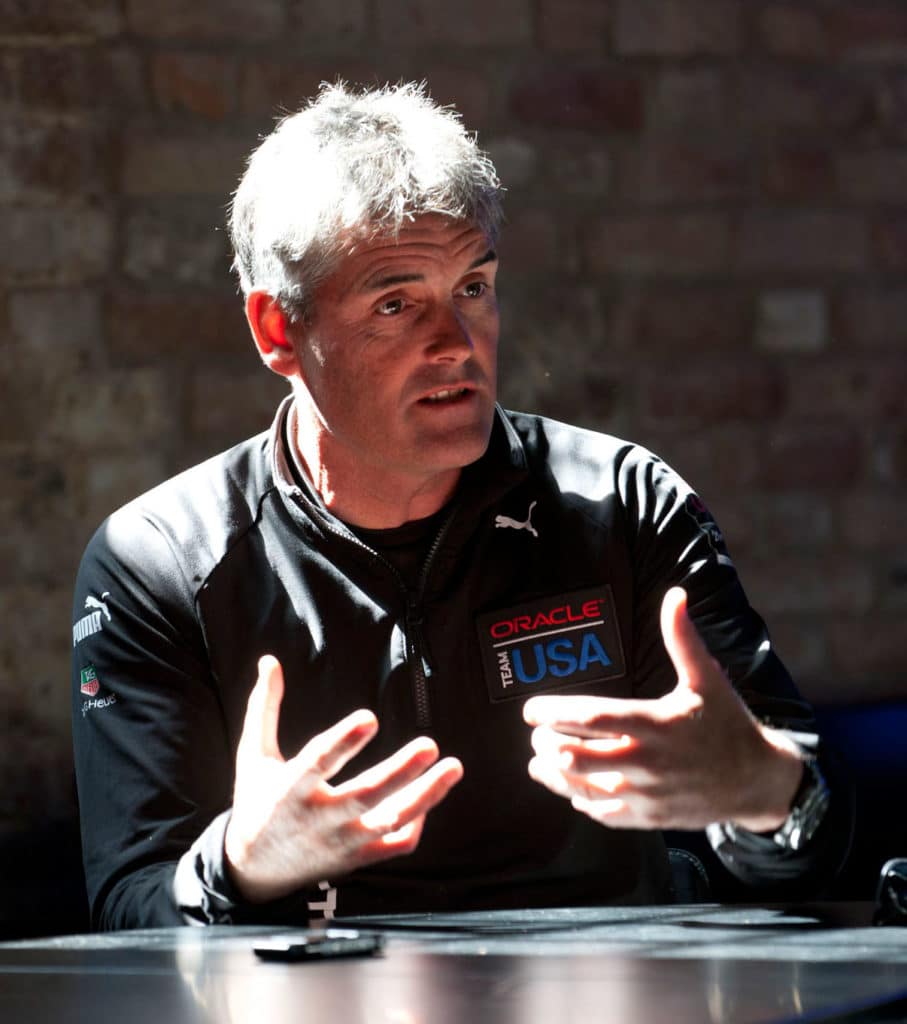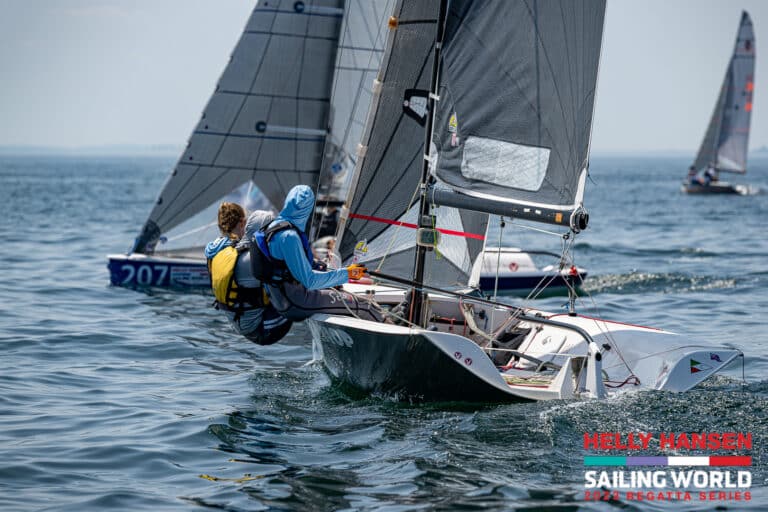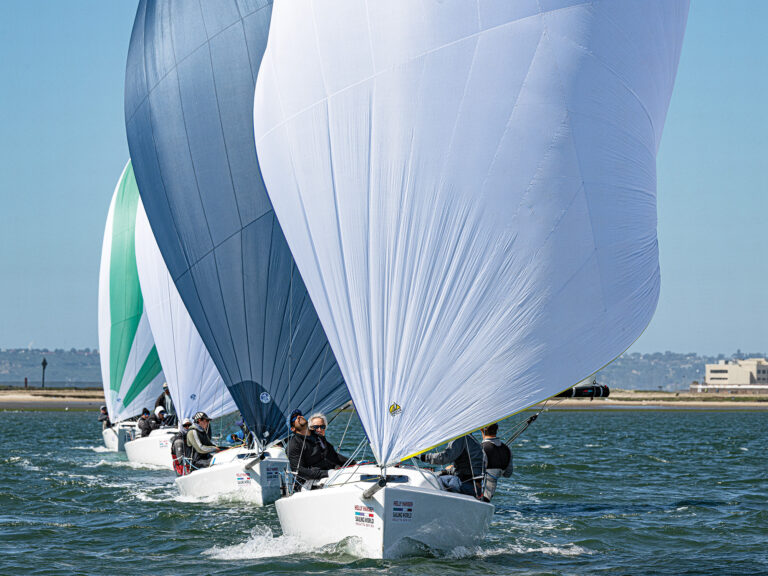
130403_Coutts_GMR
These days, Russell Coutts spends a lot more time in his office than out on the water. But for the America’s Cup’s most successful skipper, it’s all part of the challenge of the game. In fact, he appears to be thriving amidst the barrage of criticism from fans, other teams, and San Francisco politicians. Though, to be fair, many people have been much more positive about the new look of the America’s Cup. He remains confident that once the event starts, the negativity will die down considerably and the racing will command everyone’s attention, just as he hoped it would.
******Oracle Team USA is on Day 20 on Boat 1 with Wing 2. Boat 2 won’t launch until the end of April; what’s the plan to ensure the Defender is ready for the main event in September?
****RC:** We have our two foiling AC45s, which we’re training on, and once we get our two 72s on the water—the boat should launch at the end of April—we plan on sailing and racing those two boats against each other up until the end.
So, you’re feeling confident that things are looking good for the team?
RC: Yes, I think so far, so good for Oracle Team USA. We recovered well from the capsize, and that seems like a distant memory now. As long as we don’t get a repeat of that, we’ll be in pretty good shape. Rod Davis recently made a comment about the deception that goes on in the AC, but in my experience, that doesn’t really matter a damn. It doesn’t win or lose you the Cup. I just don’t think it’s been a big factor in any America’s Cup I’ve been involved with, it’s the media that make more of it. Whether we did or not [spy] in my opinion wouldn’t affect the outcome one little bit. When I assess our program, not only do we have a very good design team, we also have a very good sailing team, so I think we’re looking good.****
Oracle and Artemis have not had the opportunity to train together for a variety of reasons. Explain why this is a good or a bad situation for Oracle.
RC: Probably bad because it’s always good to work out with another team; the more we can sail with a team like Artemis on a regular basis, it enhances the competitive juices and shows you a different perspective about things. You can learn a lot.****
After Artemis had a brief chance to sail alongside Oracle’s second AC72, they then decided to add foils to their boat. Can you comment on that chain of events?
RC: Things are changing so fast with the technology, and I don’t think any of it is particularly earth shattering in that foils have been around a long time. I think there’s design talent in that team that could analyze the situation pretty quickly. Probably they’ve also got an AC45 that they’re practicing foiling in. They could probably learn a lot just from looking at what some of the other teams have done and factor that into where the future is going, and they may end up just as well off, or even better. The playing field is changing so fast I don’t think it’s necessarily all about sailing time on the water and time with the equipment. It may be more about the choice of the equipment you choose to build and how you apply that to the boat at the end of the day that matters. In 1995 AC Team NZ launched our boats literally just months before the Cup—I think two months before racing began. Some other teams sailed much longer that that; developed boats full size etc. But we chose a better design path, got a better design product, and that was the winning factor. There are plenty of other examples over the years. It’s easy to fall into the trap of saying, “We’re doing more, and therefore it’s going to be better.” I don’t necessarily think that’s the case. I only think you need to have to have the best equipment on race day, nothing else matters.****
How will the course on San Francisco Bay be adapted to manage AC72 racing?
RC: I don’t think there’s going to be much difference, and the sailors will adapt to the shorter confines of the course. Just like any of the boats over any of the AC generations, people start off by saying that they’ll never be able to sail about, that they’ll be so difficult, and so on. After the crews become pretty good at it, they say, “Well, actually we can.” Even the Version 5 boats, racing them inside Auckland Harbor, if you had gone back to the very origins of that class, people thought we couldn’t possibly do that. It may start off being a really tight racetrack for the teams, but after a while they’ll get used to it. ****
What was your favorite World Series venue, and what’s the plan for continuing it beyond this spring?
RC: There is a plan to continue and expand the concept, there’s no doubt about it. If Oracle Team USA were fortunate enough to win, there’d be a break while things got reorganized, but the plan would be to continue it for sure. San Francisco was probably the best just because of the wind conditions, etc., but I also thought Newport was good. Frankly, they’re all good—Plymouth was a good venue when you look back. It has been a great series. You have to remember that two years ago—August 2011—this thing started. Before that we had nothing. There have been a lot of situations where you could have done a lot of things better, but that’s good news for the future. We now have a concept that did work, that did create excitement, and that did turn out to be a good television product. I think it’s nicely in a position of refinement now, making sure that costs are well managed, making sure that the television production follows the right process, making sure that the competition itself develops into a meaningful format in that there’s more teams in the game. These things will make the product better in the future.****
You’ve won the Cup for other countries and seen the national response to sailing in other countries. What do you think are the key differences about the perception and response to sailing in the United States?
RC: I don’t think there is that much difference actually in the U.S. Let’s wait and see after this America’s Cup and after the national broadcasting. If you’re comparing the America’s Cup in San Diego to some of the other America’s Cups, it was hard to get interested in San Diego when there was no real event village and the racing was miles out to sea, where no one could see it. You’d have to be an extreme optimist to think that was going to be a great series. Now we have a proper event village, a festival of activities, and racing will be right on shore for people to see it. Just as they started to at the World Series events, Americans are going to think this will be a fun thing to come along and be part of. In Newport, R.I., the town itself almost because an America’s Cup village. Imagine if they had opened up racing inside Newport Harbor what it would have been like. As it was, it was pretty good. Moving it into a major city is another jump again. I say let’s wait and see how Americans respond this time.****
If you win the Cup, what changes would you foresee?
RC: I think the idea of ACRM has been a good one, where you have an entity that manages the competition on behalf of all the competitors. That concept could be expanded more widely to the America’s Cup, where you do things more collectively rather than as one entity. I think you also could, with cooperation from all the teams, do things for a longer term to allow the media and sponsorship partners, etc., to participate for a longer term. For example, all of the competitors who enter next time would agree to keep to a certain format and certain type of boat, certain venues in the World Series, etc., even if they won the next America’s Cup. And instead of extending [a format] to only every four years, you’re up to eight straight away which gives you more scope to develop the product and create more value for the commercial partners and media. A simple example is media rights. A lot of the big media players would probably find this much more valuable if they could sign up for longer term rights. If you know your entries and you know one of them is going to win the next America’s Cup and they agree to take over those rights should they win, then all of a sudden you can give those media companies what they want. It would make a big difference, for example, if we knew that after this event, NBC would be carrying on for the next one as well. These are the sort of things that could be expanded in the future.****
**Do you miss being on the boat?
**Some days, but other days not. The America’s Cup is an incredibly challenging world. There are lots of things going on, and that’s the great thing about it. I certainly love my time sailing, but I also like the complexities and challenges involved elsewhere as well. It’s fun at all levels.****









